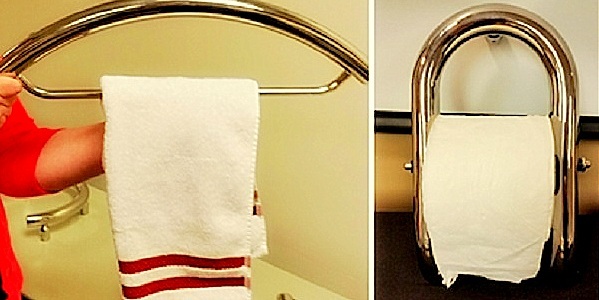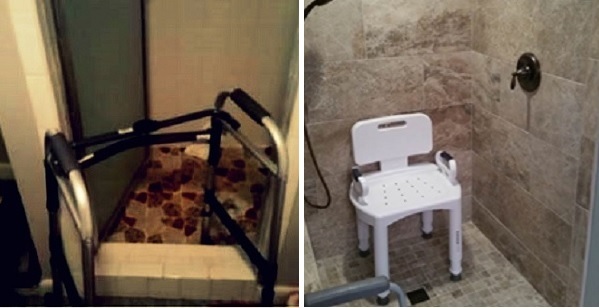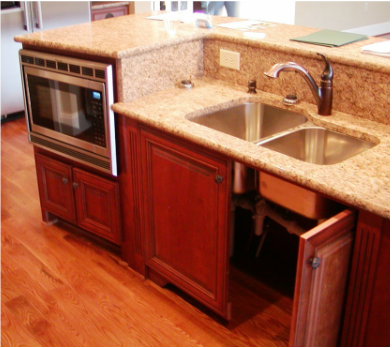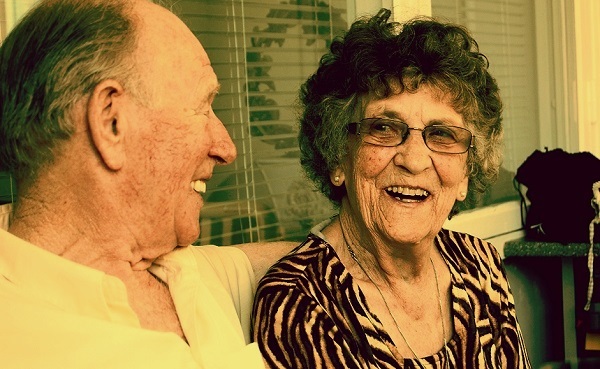
We quickly get inside to safety if there’s a threat of lightning. Interestingly enough, it is seven times more likely that a fatality can happen in a bathtub, for any age, than that someone can be struck by lightning, per the National Safety Council.
A Safe Bathroom for SeniorsBathing and related activities are often more difficult for older people, especially those with disabilities. Due to multiple reasons, bathrooms can be very hazardous.
As part of my aging-in-place senior living series, I’ll go over some ways to keep your bathroom attractive while giving it a safe, “ageless” design for yourself or for your senior parents.
Grab Bars Reduce Risk of Falling
Installing safety features in the bathroom is key to reducing the risk of falling. More than one in three seniors over age 65 fall each year, and the National Institute on Aging (NIA) says 80% of these falls are in the bathroom.
Anyone can stumble and fall in the bathroom, but having poor muscle strength and balance is strongly associated with increased risk. Most falls occur while sitting down/getting up from the toilet or attempting to use towel bars, sink tops or other objects to support balance.
Insufficiently secured towel racks can fall when gripped for support. Jacqi Dix, President of Personal Access Solutions, shares a solution–grab bars can be aesthetically integrated into toilet racks and towel bars.
Reduce the Water Factor:
RiskBathtubs are difficult to step over, and sliding shower doors can move unexpectedly when entering and exiting the tub. While walk-in showers are ideal, many are not wide enough.
Remodel Your Shower
Peggy Mackowski, my CARE colleague and the VP of QDC Quality Design & Construction, ran into this problem with her mother. When Peggy’s mom suddenly found herself needing a walker, the size of her bathroom was inadequate. The first photo shows how Peggy’s existing walk-in shower could not accommodate her walker.
(Before and After photo at end of this blog. ) The second “after” photo shows how her bathroom was remodeled in the same tight space to have a curb-less shower and a raised toilet with handles–a much safer choice for Peggy’s mom.
Add Features to Increase Safety
Recently, I had a discussion with a senior citizen who brought up a problem with the curb-less shower doors swinging out into a bathroom and getting the floor wet. Her friend found a solution of using very thin shower mats, which are available at Target.
I belong to the Home Builder’s Association CARE (Council for Ageless Residential Environments), and I asked around to other experts as to why doors do not swing in to reduce water dripping onto the rest of the bathroom floor.
I was told that, if the shower area is too small, or that if a person falls, others have to be able to get access into the shower to help the fallen person who might be blocking the door otherwise.
In a curb-less shower, also consider a trench drain, where the water will drain backwards into a trench. Textured tiles and special grouts can also be used to reduce water-related risks.
Other Ideas for Consideration
There are even more options. I found a list of ideas to increase bathroom safety.
The magnitude of problems older people experience in the bathroom and the seriousness of the situation raises many important factors to be considered.
I hope this article and others in my “Aging in Place” series briefly gives ideas and photos for you to consider how to make a safer place to live for your, or your senior family member’s, home.
A Safe Bathroom for SeniorsBathing and related activities are often more difficult for older people, especially those with disabilities. Due to multiple reasons, bathrooms can be very hazardous.
As part of my aging-in-place senior living series, I’ll go over some ways to keep your bathroom attractive while giving it a safe, “ageless” design for yourself or for your senior parents.
Grab Bars Reduce Risk of Falling
Installing safety features in the bathroom is key to reducing the risk of falling. More than one in three seniors over age 65 fall each year, and the National Institute on Aging (NIA) says 80% of these falls are in the bathroom.
Anyone can stumble and fall in the bathroom, but having poor muscle strength and balance is strongly associated with increased risk. Most falls occur while sitting down/getting up from the toilet or attempting to use towel bars, sink tops or other objects to support balance.
Insufficiently secured towel racks can fall when gripped for support. Jacqi Dix, President of Personal Access Solutions, shares a solution–grab bars can be aesthetically integrated into toilet racks and towel bars.
Reduce the Water Factor:
RiskBathtubs are difficult to step over, and sliding shower doors can move unexpectedly when entering and exiting the tub. While walk-in showers are ideal, many are not wide enough.
Remodel Your Shower
Peggy Mackowski, my CARE colleague and the VP of QDC Quality Design & Construction, ran into this problem with her mother. When Peggy’s mom suddenly found herself needing a walker, the size of her bathroom was inadequate. The first photo shows how Peggy’s existing walk-in shower could not accommodate her walker.
(Before and After photo at end of this blog. ) The second “after” photo shows how her bathroom was remodeled in the same tight space to have a curb-less shower and a raised toilet with handles–a much safer choice for Peggy’s mom.
Add Features to Increase Safety
Recently, I had a discussion with a senior citizen who brought up a problem with the curb-less shower doors swinging out into a bathroom and getting the floor wet. Her friend found a solution of using very thin shower mats, which are available at Target.
I belong to the Home Builder’s Association CARE (Council for Ageless Residential Environments), and I asked around to other experts as to why doors do not swing in to reduce water dripping onto the rest of the bathroom floor.
I was told that, if the shower area is too small, or that if a person falls, others have to be able to get access into the shower to help the fallen person who might be blocking the door otherwise.
In a curb-less shower, also consider a trench drain, where the water will drain backwards into a trench. Textured tiles and special grouts can also be used to reduce water-related risks.
Other Ideas for Consideration
There are even more options. I found a list of ideas to increase bathroom safety.
The magnitude of problems older people experience in the bathroom and the seriousness of the situation raises many important factors to be considered.
I hope this article and others in my “Aging in Place” series briefly gives ideas and photos for you to consider how to make a safer place to live for your, or your senior family member’s, home.
http://carycitizen.com/2015/05/26/make-your-bathroom-safe-for-seniors/



